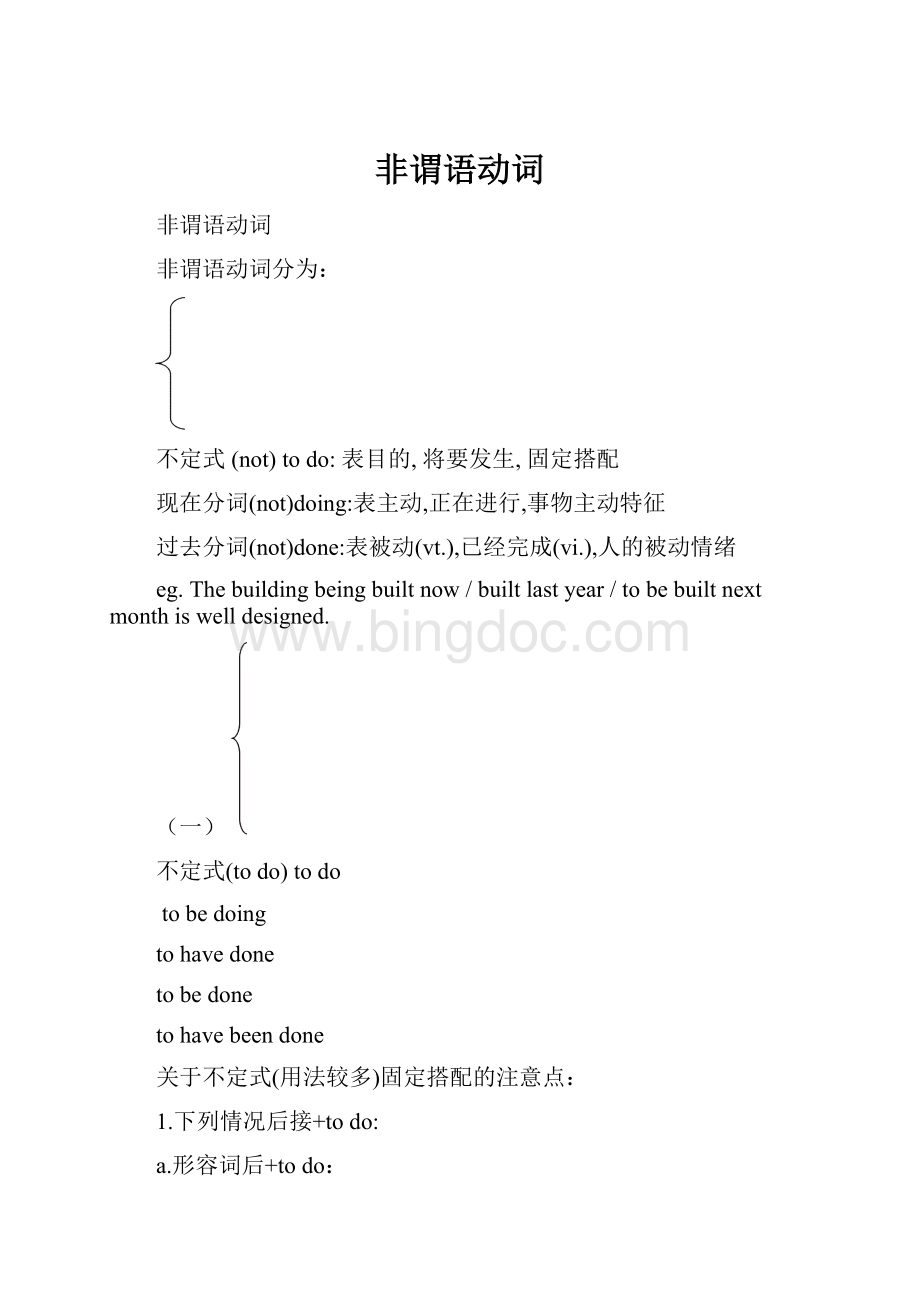非谓语动词.docx
《非谓语动词.docx》由会员分享,可在线阅读,更多相关《非谓语动词.docx(21页珍藏版)》请在冰点文库上搜索。

非谓语动词
非谓语动词
非谓语动词分为:
不定式(not)todo:
表目的,将要发生,固定搭配
现在分词(not)doing:
表主动,正在进行,事物主动特征
过去分词(not)done:
表被动(vt.),已经完成(vi.),人的被动情绪
eg.Thebuildingbeingbuiltnow/builtlastyear/tobebuiltnextmonthiswelldesigned.
(一)
不定式(todo)todo
tobedoing
tohavedone
tobedone
tohavebeendone
关于不定式(用法较多)固定搭配的注意点:
1.下列情况后接+todo:
a.形容词后+todo:
eg.Oneisnevertoooldtolearn.
b.疑问词(why,if除外)后+todo:
eg.Idon’tknowwhattodonext.
c.bethefirst(序)+(名)后+todo
eg.Heisthefirststudenttocometoschool.
d.only后(表示意想不到的结果)+todo
eg.Hearrivedhome,onlytofindthecomputerstolen.
e.sb./sth.+besaid/thought/…+todo
eg.Thebookwassaidtohavebeenprintedforaweek.
f.形式主/宾语it后+todo,
eg.Itisnecessarytomasteraforeignlanguage.
Wefinditnecessarytomasteraforeignlanguage.
2.不定式省略to
a.感官动词(feel/see/watch…)和使役动词(make/let/have)的主动形式省略to,(但被动形式仍加to)
eg.Wesawthethiefentertheoffice.
Thethiefwasseentoentertheoffice.
b.并列(and/or)后的不定式省略to(但表对比,如:
nottodo,buttodo)
eg.I’dliketoreadandwrite.
I’dlikenottoreadbuttowrite.
(二)现在分词(-ing):
(not)doing/havingdone
eg.Hearingthesadnews,sheburstintotears.
Notknowinghowtodoit,heturnedtomeforhelp.
Nothavingreceivedanyreply,Idecidedtowriteagain.
Theoldmangotoffthebus,supportinghisson.
动名词(not)doing/beingdone):
相当于名词,在句中当主/宾,常置于介词后,或用于固定搭配
eg.Iapologizefornotlettingyouknowaheadoftime.
动名词的复合结构:
sb’s/my/Peter/him+doing
eg.Mary’scominglatemadeusunhappy.
CanyouimaginePeter’s/his/Peter/himturningup?
(三)过去分词(ed):
(not)done
eg.Theoldmangotoffthebus,supportedbyhisson.
Doyouknowtheoldmansupportedbyhisson?
(四)独立主格结构:
逻辑主语+doing(主动)/done(被动)
eg.Timepermitting,I’llgowithyou.
ItbeingSunday,wewentforanouting.
Alltheguestshavingarrived,thepartywasdeclaredopen.
Herteafinished,shewentonwithherwork.
(五)悬垂分词(固定搭配)
1.Totell(you)thetruth(说真话)
2.Tobeginwith(首先)
3.Comparedto/with…(与……相比)
4.Givensth.=Consideringsth.(考虑到……)
5.Havingsuffered…(遭受…)
6.Judgingfrom…(从……判断)
7.Generallyspeaking(总体上说)
8.Honestly/Franklyspeaking
=Tobehonest/Frank(老实说/坦率地说)
9.Talkingof…(说起)
10.Beginning…(从……开始)
11.Suppose/Supposing(that)=Providing/Provided(that)(假如,如果)
12.Believeitornot(信不信由你),
(六)一些动词的固定搭配:
1)常见接不定式作宾语(v.+todo)的动词有:
hope,wouldlike,afford,agree,attempt,decide,demand,expect,fail,hope,intend,manage,plan,pretend,refuse,want,wish等
2)常见带介词(to+doing)的动词短语有:
beaccustomedto,be/getusedto,beupto,cometo,devote…to,getdownto,leadto,lookforwardto,objectto,payattentionto,stickto等to后+doing(动名词)。
3)常见带复合宾语(v.+sb.+todo)的动词有:
advise,allow,ask,beg,cause,encourage,expect,forbid,force,get,invite,,order,persuade,permit,tell(叫),train,want,warn,wish等。
eg.Weallowedhimtogotothelibrary.
Hewasallowedtogotothelibrary.
4)常见用不带to的不定式作宾语补足语(v.+sb.+do)的动词有
使役动词:
have,let,make
感观动词:
lookat,notice,observe,see,watch,hear,listento,feel
eg.HemadeTomcleanthefloor.(主动)
Tomwasmadetocleanthefloor.(被动)
Wewerelisteningtohimplaythepiano.(主动)
Hewasbeinglistenedtotoplaythepiano.(被动)
5)常见接动名词作宾语(v.+doing)的动词有:
admit,advise,avoid,acknowledge,allow,appreciate,bear(承受),delay,deny,enjoy,escape(避免),excuse,fancy(喜欢),finish,forgive,imagine,keep,mention,mind,miss(错过),pardon,permit,practise,resist,risk,stand(忍受),suggest,understand等。
注意:
keep(on)通常不与表示静态的v-ing连用。
如不说:
Hekeptstanding/sitting/lying/sleepingthere.
6)常见带现在分词作补足语(v.+sb.+doing)或过去分词作补足语的动词有:
catch,have,keep,leave,make,set,send,start;find,lookat,notice,observe,see,watch,hear,listento,feel等。
eg.Theycaughthimstealingmoneyintheshop.
Hemanwascauthtstealingmoneyintheshop.
(七)区别
1.remember,forget,try,regret,mean,stop,consider,like,love,can’thelp,goon等所带的动名词(doing)或不定式(todo)用法区别如下:
动词
接动名词作宾语
接不定式作宾语/状语/补足语
remember
记得做过某事(已做过)
记得去做某事(尚未做)
forget
忘记做过某事(已做过)
忘了去做某事(尚未做)
try
尝试去做某事
尽力去做某事
regret
对做过的事表示后悔
对要做的事表示遗憾
mean
意味着某事发生
打算做某事
stop
中断正在做的事情/停止做某事
中断正在做的事去做别的事(todo是目的)
consider
考虑做某事
认为做某事(todo是补足语或状语)
like/love
一贯喜欢做某事
某特定时间或场合喜欢做耨事
can’thelp
情不自禁做某事
不能帮助做某事(to)do
goon
继续做未完成的事情
做完一件事,接着做另一件事
2.advise/allow/permit/forbid/consider/imagine+doing
advise/allow/permit/forbid+sb.todo/tobe
sb.beadvised/allowed/forbidden…+todo/tobe
3.sth.+need/want/require+doing(主动)/tobedone(被动)
sb.need/want/require+sb.todo
sb.+need/want+todo(主动)
4.see/watch/hear+sb.do(主动,经常,结果)
see/watch/hear+sb.doing(主动,进行,过程)
see/watch/hear+sb.done(被动)
5.havesb./sth.+todo(有某事要做)
havesb./sth.+do(使某人做某事)
havesb./sth.+doing(使某人一直做某事)
havesb./sth.+done(使某人被)
6.其他的固定搭配句型
a.preferdoingtodoing=prefertodo+ratherthando
=woulddo+ratherthando=wouldratherdothando
b.hadbetter/wouldrather+do
c.cannothelpbut+do=can’thelpdoing(忍不住做)
d.It’snouse/good+doing…
e.Thereisnopointindoing…
f.bebusy
spend/wastemoney(time)
havetrouble/problems/difficulties+(in)doing
haveahard/goodtime
belong(渴望)
代词
代词是用来代替名词、形容词、数词等词的词。
代词主要分为人称代词、物主代词、反身代词、指示代词、不定代词、疑问代词、连接代词和关系代词等。
一、代词的分类
数
人称代词
物主代词
反身代词
指示代词
不定
代词
疑问
或
连接
代词
关系
代词
主格
宾格
形容词性
名词
性
单
数
I
me
my
mine
myself
this
that
all
both
each
some
any
most
none
neither
nobody
anyone
who
whom
whose
what
which
whoever
whatever
…
who
whom
whose
which
that
as
you
you
your
yours
yourself
he
him
his
his
himself
she
her
her
hers
herself
it
it
its
its
itself
复数
we
us
our
ours
ourselves
these
those
you
you
your
yours
yourselves
they
them
their
theirs
themselves
二、代词的用法
(一)人称代词、物主代词和反身代词
1、人称代词:
人称代词分为主格、宾格。
主格一般在句中充当主语;而宾格一般在句中充当动词或介词的宾语,如:
Weknownothingabouttheresultsofthefinaltermexamination.
Theboyisillinhospital,sotheyarelookingafterhim.
Myteachershowedusstudentsthepicturestakenonapinic.
2、物主代词(“……的”):
物主代词分为形容词性物主代词、名词性物主代词。
形容词性物主代词在句中只能充当定语,后接名词;而名词性物主代词在句中充当主语、宾语或表语,如:
Heandhisassistantsareworkingontheproject.Bestwishesforyouandyours.
Thisnotebelongstohimandthatoneismine.
3、反身代词(“……自己”):
反身代词在句中须与前面的名词或代词保持一致,在句中充当宾语、表语或同位语,如:
Ican’texpressmyselfinEnglish.Hehimselfisnotinterestedinthefilm.
(二)指示代词
指示代词this,that,these,those在句中充当主语、宾语、表语或定语。
this,these一般指代时间或空间上较近的人或事;而that,those一般指代时间或空间上较远的人或事,如:
This/ThatiswhatIsaid.(这/那就是我所说的。
)
注①:
this,that都可用于指代上文提到过的事情;若指代下文将要提到的事情,只能用this,如:
Wehavenotimetodoit,andthis/thatisourtrouble.Thereasonisthis.(原因如下。
)
注②:
有时为了避免重复,that和those可代替前面提到的事物,如:
TheweatherofBeijingisdifferentfromthatofFujian.
Theseapplesarebetterthanthoseweboughtyesterday
(三)疑问代词和连接代词
疑问代词who,whom,whose,what,which常用于特殊等疑问句中,指代人或事物;而连接代词who(ever),whom(ever),whose(ever),what(ever),which(ever)常用于引导名词性从句,如:
Whowillgivethelecturethisweekend?
Whichdoyouprefer,theredskirtortheblueone?
Wedon’tknowwhatpresenthewillgiveus.Whoeverbreakstherulesshouldbepunished.
Whatshecouldn’tunderstandwaswhyonlyafewstudentsshowedinterestinherlessons.
(四)关系代词
关系代词who,whom,whose,which,that,as引导定语从句,在定语从句中充当主语、宾语,如:
Themanwho/thatisreadingthereisSmith.TheboytowhomIreferredisJack.
Hecamebackearlier,whichmadehismotherveryhappy.
Thefilm(which/that)Isawyesterdayisveryinteresting.
Thebookwhosecoverisnewbelongstome.Thisissuchagoodfilmaswealllike.
(五)不定代词
1、不定代词的分类
不定
代词
可数
each,one,many,(a)few,both,another,either,neither
不可数
much,(a)little
可数、不可数
all,some,any,most,none,other,such
复合代词(单数)
somebody,nobody,anyone,everyone,something,nothing,anything,…
2、表示两者的代词、三者或三者以上的代词
两者
三者或三者以上
都,全部
both
all
都不,全部不
neither
none
任何一个
either
any
另一个
theother
another
每一个
each(或两者以上)
every(形)
相互,彼此
eachother(或两者以上)
oneanother
如:
Therearegreentreesoneachside/eitherside/bothsidesoftheroad.
Thestudentsoftenhelpeachother/oneanotherwiththeirstudies.
—Whichofthethreebooksdoyoulike?
—None,theyareallboring.
—Willyourparentsgotothecinematonight?
—Both,theyarefree.
—Whatwouldyoulike,coffeeortea?
—EitherisOK.
Thecoupledidn’tfinishthetaskontimebecauseneitherofthemhadenoughexperience.
Itiseasytodotherepair.Allyouneedisahammerandsomenails.
3、区别下列几组不定代词
1)“一些”some与any(可以是名词,也可以是形容词)
some:
“一些”(用于肯定句),可替代不可数名词或复数名词;还可译为“某些或某一个”,可接单数名词或复数名词;
any:
“一些”(用于否定句、疑问句或if条件句),可替代不可数名词或复数名词;还可译为“任何一个”,可接单数名词;如:
He’llbebackhereverysoonforsomereason(s).Idon’thaveanymoneyonme.
Ifyouhaveanywater,pleasegivemesome.
注:
some在疑问句中表示建议、诚意或愿望等委婉的语气,如:
Wouldyoulikesometea?
Won’tyoutrysomerice?
2)否定代词:
none,noone/nobody与nothing
none:
“没有人或事”,只表数量(howmany),后可+of短语;
noone/nobody:
“没有人”,只表人(who),后不+of短语;
nothing:
“没有事”,只表事物(what),后不+of短语;如:
--Howmanypensarethereonthetable?
--None.
--Howmanyofthemcanunderstandhim?
--None.
--Whoisintheclassroom?
--Noone./Nobody.
--What’sinthebox?
--Nothing.
Noone/Nobodychoseanyoftheofferings,becausetheyallfoundthemdissatisfactory.
3)“每一”:
each与every(形):
each:
指两个或两个以上的人或事物;强调个体。
也可充当形容词(后可接单数名词);代词,可+of短语;还可以在句中充当同位语。
every:
指三个或三个以上的人或事物;强调全体。
形容词(后接单数名词);不可+of短语;还有“每(隔)……”之思。
如:
Eachhashisgoodpoint.Eachofthemhashisowndictionary.
Thechildreneachhaveapresent.Iknoweverymember(=allmembers)ofyourfamily.
Wehandinourhomeworkeve